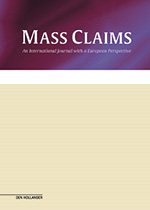Financial Barriers in Environmental Collective Actions: The Role of Third-Party Litigation Funding
Charlotte de Meeûs1This paper explores if and how Third-Party Litigation Funding ("TPLF") can be used as a means to enhance access to justice in environmental collective litigation in the EU. It assesses whether environmental collective actions are, by their nature, compatible with TPLF. Then, it discusses possible initiatives that could be implemented to encourage third-party litigation funders to expand the scope of their activities to environmental claims that continue to experience a funding gap.
1. Introduction
While it is rising across the world,2 environmental litigation is often hindered by a lack of adequate funding. Financial obstacles are said to constitute an important barrier to access justice in this sector.3 The collective nature of environmental collective redress exacerbates these financial constraints, as collective actions entail a wide range of costs extending beyond the "traditional" expenses of legal proceedings.4 Moreover, public funding suc...
U heeft op dit moment geen toegang tot de volledige inhoud van dit product. U kunt alleen de inleiding en hoofdstukindeling lezen.
Wanneer u volledige toegang wenst tot alle informatie kunt u zich abonneren of inloggen als abonnee.


